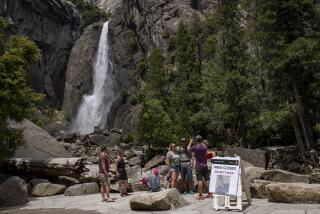10,000 people at risk of hantavirus after Yosemite stays, CDC says
YOSEMITE NATIONAL PARK -- A new nationwide advisory issued Friday by the Centers for Disease Control and Prevention said that as many as 10,000 people were at risk for contracting hantavirus after staying in Yosemite National Park this summer.
Park officials said Friday that they had sent letters and emails to about 3,100 people who reserved one of the 91 “signature tent cabins” in the park’s popular Curry Village between June 10 and Aug. 24. The CDC alert — issued through its health advisory network, which reaches healthcare providers as well as health departments — said that an estimated 10,000 people stayed in the tents during that time.
Six confirmed cases of the rare, rodent-borne disease have been linked to the park, officials said. Four have been traced to the signature tent cabins; the remaining two were still under investigation, Yosemite spokesman Scott Gediman said Friday.
The letters warn recipients to seek immediate medical attention if they or anyone in their party start to show symptoms of the disease.
The park also set up an emergency phone line Tuesday that drew 900 calls its first day, Yosemite spokeswoman Kari Cobb said.
The final guests were moved from the cabins Tuesday, Gediman said. By Friday, all tents had been cleaned and retrofitted to repair gaps in the walls that allowed virus-carrying deer mice to get inside.
Officials are still waiting to see if the efforts are successful at keeping the mice out — if not, Gediman said, the cabins could be moved or closed permanently.
Hantavirus is a rare disease — 587 cases were diagnosed nationwide from 1993 and 2011, according to the CDC. Of those, one-third were fatal.
But the cases at Yosemite are perhaps even more rare. Both park officials and public health authorities said they had not heard of more than one case of the disease in the same location within a year.
More to Read
Sign up for Essential California
The most important California stories and recommendations in your inbox every morning.
You may occasionally receive promotional content from the Los Angeles Times.











